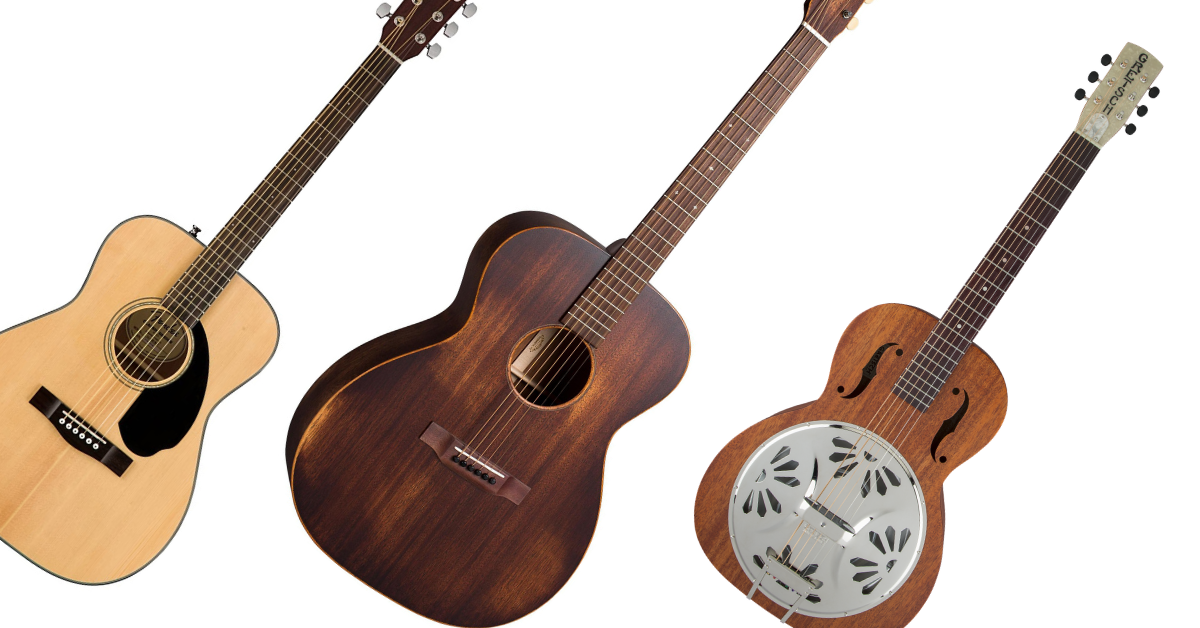Choosing the best acoustic guitar for blues can help us to achieve the characteristic expressiveness of the genre and exploit the different sonorities that have made it so popular. Blues is a musical genre in which instrumentation plays a fundamental role, especially during the improvisational phrases led by the saxophone, trumpet, piano or guitar. The latter will not only reinforce the rhythmic base of the songs, but will often be the protagonist of the songs with solos and riffs.
So, choosing a blues guitar may not be an easy task. While the musician’s style and goals with the genre may have an influence, there are several factors to consider before selecting the instrument.
What is the best acoustic guitar for blues?
The best acoustic guitar for blues is one that is easy to play. Initially the acoustic guitar was the standard in this genre, and when you wanted to increase the sound of the guitar, resonators were used (see guitar with resonator). However, it was the electric guitar that has stood out in the genre until today.
So, if we think about choosing an acoustic blues guitar, we should expect to get an instrument powerful enough to match the sound of an electric guitar. Of course, the amplifier of an electric guitar will not be matched by an acoustic guitar, but with a good instrument we can achieve a sufficiently clear and clean sound.
Best acoustic guitars for the blues
The best acoustic guitars for blues are chosen based on their material and shape. That is, the wood with which the guitar is made will help us determine the type of strings it can support and, consequently, the quality of the sound it can produce. The best acoustic guitars for blues will use high tension strings, so expect them to be made of strong and durable materials.
On the other hand, the shape of the guitar will depend on the musician’s taste and objective, since some aspects such as the body of the instrument or the dimensions of the neck could influence its performance. While for some a small radius on the fingerboard would be convenient, for others a flat neck would be more comfortable.
Thus, in this selection all these factors have been taken into account to obtain the following three guitars:
- Fender CC60S
- Martin Street Master 000-15M
- Gretsch G9200
Fender CC60S – The best standard choice for blues playing
The Fender CC60S acoustic guitar has a top, back and sides made of mahogany wood. Due to the strength of this material and its ability to amplify the sound, the Fender CC60S will have a remarkable volume and loudness that will make it very useful when playing with other instruments.
With a scale of 643mm (25.3 inches) and a fretboard radius of 305mm (12 inches), this guitar will allow comfortable playing of chords and solos along the neck. At the same time, the slim 43mm (1.6 inch) nut will make it easier to play chords where it is convenient to use your thumb on the sixth or fifth string.
For more information you can check out the specifications of the Fender CC60S on Amazon.
Martin StreetMaster 000-15M – Best for fast fingerings with classic blues bending
The Martin StreetMaster 000-15M acoustic guitar is a guitar made with mahogany wood and high tension strings. These materials give it a powerful sonority that can stand out among a group of instruments.
A special feature on the Martin StreetMaster is its large fretboard radius of 406mm (16 inches). Such a radius will result in an almost completely flat neck, which will prolong the sound of the classic bendings used in blues.
For more information, please see the Martin StreetMaster 000-15M specifications on Amazon.
Gretsch G9200 – The best for amplified blues sounds
The Gretsch G9200 is another acoustic guitar made of mahogany wood. Its sonority is naturally amplified by the material used in its construction and its high tension strings.
The most outstanding feature of this guitar will be the resonator fixed to its body. This will give a volume to your sound that is very characteristic of the blues. In addition, it has a V-shaped neck very popular due to its presence in guitars of artists such as Eric Clapton. This guitar is a good choice for gigging and recording because of the warmth and power it can transmit.
For more information you can check out the Gretsch G9200 specs on Amazon.
Frequently Asked Questions
Should I buy an electric or an acoustic blues guitar?
Naturally, the electric guitar has gained more popularity in this genre. The sound of the electric guitar and its ability to amplify itself help to obtain a very powerful guitar, useful for those who wish to play guitar solos. Nevertheless, both guitars can produce good results. The musician must consider what sonority he expects to obtain, which instruments he plans to accompany himself with and which guitar he feels more comfortable with.
What strings are best for an acoustic blues guitar?
Considering that acoustic blues guitars are made of strong woods, it would be ideal to use high tension strings. With these strings you can get a clearer and more amplified sound in the body of the guitar.
Does the guitar body affect the blues guitarist?
The guitar body affects the performance of every guitarist regardless of genre. In the case of acoustic guitars, the body will influence according to the position the musician takes when playing. The musician should try different body types according to his needs.
Is there a difference between the blues guitar and the regular guitar?
The blues guitar is not a specific guitar, but a set of guitars that are best suited to the genre. There are guitars that get more out of the blues while others don’t get the right sonority. In any case, the difference will be made by the musician himself when playing.
What is the best blues guitar brand?
The brand of the guitar will also ultimately depend on the style and taste of the musician. While some famous musicians, like B.B. King, opted for Gibson guitars, others like Eric Clapton preferred Fender guitars. The choice is based on the final sonority to be obtained and on the musician’s ability to obtain it with one guitar or another.





